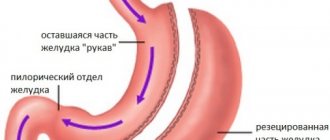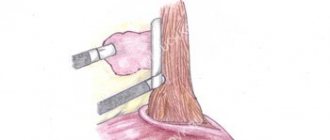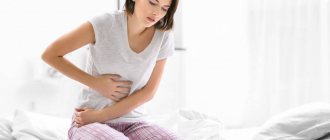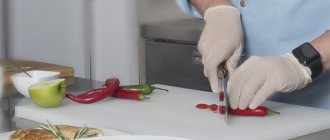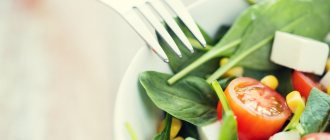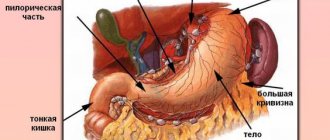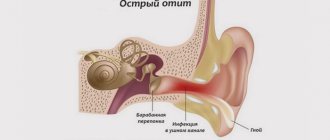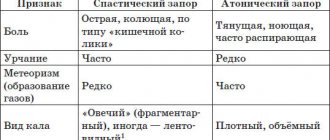Share information with your Facebook friends
VK
Laryngopharyngeal reflux belongs to the extraesophageal syndromes of gastroesophageal reflux disease (GERD). In this case, there is a reflux of stomach contents (acid, pepsin, bile acids) into the larynx and pharynx. Patients most often do not have the classic symptoms of GERD, and the most prominent complaints are: pain and/or burning in the throat, sore throat, chronic cough, dysphonia (voice disturbance), dysphagia (impaired swallowing), feeling of a lump or hair in the throat, etc. n. It is believed that up to 50% of patients with laryngeal and voice disorders have reflux. Most often, these manifestations of GERD are the result of so-called nocturnal reflux, when the patient is in a horizontal position for a long time, as well as due to excessive food intake at night. A diet for reflux is necessarily recommended for all patients suffering from GERD.
General rules. Duration of the diet.
The main task of therapeutic nutrition for esophageal esophagitis is to completely eliminate damage to the mucous membrane by mechanical and chemical factors.
For esophagitis, table No. 1 is prescribed. In nutrition you must adhere to a number of rules:
- the number of meals should be 5-6 times. Portions are small. This dietary tactic for esophagitis allows the stomach to stretch unnecessarily and produce excess hydrochloric acid.
- Food should not be too hot or cold. The optimal temperature for food is 25-50 C.
- You can't eat on the go. You need to eat slowly and chew your food thoroughly.
- You should not drink water immediately after eating. It is permissible to drink only 30-40 minutes after eating.
- Dishes can be steamed, stewed, baked or boiled. You can't fry.
- Limit salt intake as much as possible.
Symptoms of reflux gastritis
Heartburn is an essential symptom of gastritis.
Reflux gastritis differs from other forms of the disease in that it has more severe symptoms.
In some patients, the disease is accompanied by pain and discomfort in the upper abdomen, in the epigastric region.
In addition, pain can appear on an empty stomach - this phenomenon is called “hunger pain”. Asymptomatic reflux gastritis also occurs. Other possible symptoms:
Nutrition for acute esophagitis:
In case of exacerbation of esophagitis, diet 1A should be followed for no more than 10 days. This diet is strict and if you stick to it, the symptoms of the disease will stop fairly quickly. As soon as the discomfort and symptoms of exacerbation subside, you can move to table 1B. This table is more complete in nutrients.
Notice!
Acute esophagitis is a contraindication for spa treatment: it is better to go to a hospital.
If you have a chronic
form, then you should regularly
carry out preventive treatment
.
What is reflux - esophagitis?
Esophagitis is a common disease that affects the digestive organs
If you suffer from insufficiency of the cardiac sphincter (this is a muscular valve that closes the gap between the stomach and the esophagus), then digestive juices and part of the food enter the esophagus. In its normal position, the sphincter should be tightly closed; it should open only when food or water flows from the esophagus into the stomach. That is, when sphincter insufficiency occurs, it is constantly in an open state, and the contents of the stomach, in which hydrochloric acid is present, can be freely thrown from the esophagus into the stomach.
If hydrochloric acid constantly affects the mucous membrane of the esophagus, it will become inflamed. This disease is called reflux - esophagitis.
Symptoms of reflux esophagitis.
Symptoms of reflux - esophagitis: heartburn, which gets worse when you lean forward or when you lie down.
Also, symptoms of reflux - esophagitis are: hiccups, regurgitation, belching of air or food, pain behind the sternum or “in the pit of the stomach”, which radiates to the heart area, left shoulder and may resemble an angina attack.
To identify the cause of the pain, it is worth visiting the clinic.
The diagnosis of “reflux esophagitis” can be confirmed using special research methods: fluoroscopy, esophagogastroscopy, esophagomanometry.
What causes cardiac sphincter insufficiency to develop?
If you push hard, like to overeat, lift heavy weights, abuse alcohol, or maybe you just often lean forward.
Also, the disease reflux esophagitis can appear against the background of diseases: hiatal hernia, chronic gastritis, gastric ulcer, duodenal ulcer, cholelithiasis, obesity.
To prescribe the correct treatment, you need to recognize the cause of the disease.
If you have been diagnosed with cardiac sphincter insufficiency, do not lift weights more than five to six kilograms; do not wear tight belts and bandages; do not do physical exercises that involve bending forward or tensing the abdominal muscles; Monitor your daily bowel movements.
You need to sleep with the head of the bed raised, on a couple of pillows, and it is also desirable that the entire upper body is in a raised position. This body position avoids the reflux of stomach contents into the esophagus.
Nutrition for reflux - esophagitis
- You need to pay close attention to your diet. Let it be fractional - five to six times a day.
- You need to eat in small portions, the last meal should be taken no later than three to four hours before bedtime.
- You can't go to bed right after lunch. You need to sit or walk for one hour: to speed up the evacuation of food from the stomach into the intestines, which will accordingly reduce the reflux of acidic stomach contents into the esophagus.
- You can only eat foods that do not cause heartburn.
- A sick person must follow the doctor’s recommendations - which involves giving up some foods and introducing their full-fledged substitutes into the diet.
- Also, you should not overeat, you need to avoid foods that cause bloating (fresh cabbage, sauerkraut, black bread, mushrooms, green peas, beans, some types of fresh fruits and berries, chocolate, hot seasonings, alcohol, soda).
- All of these products increase intragastric and intra-abdominal pressure, which causes stomach contents to be thrown into the esophagus.
- You can track which specific vegetables, fruits, and berries caused such a reaction and limit their consumption. Or better yet, just don’t eat them fresh: you can make a compote from the fruits, you can stew or bake the vegetables.
- You can't eat late. You cannot go to bed after eating, you cannot perform activities that involve bending over (washing, cleaning, etc.) after eating. It is better to walk or sit after eating.
In case of exacerbation of reflux-esophagitis, the doctor may prescribe a more strict diet: the “esophageal” table or diet No. 1 according to Pevzner.
The diet for reflux - esophagitis allows you to consume:
- soft-boiled eggs
- sour cream,
- eat a little grated low-fat, non-sour cottage cheese,
- various types of porridges cooked in water, milk porridges
- eat pureed meat and fish soufflé,
- cook meatballs, steamed cutlets,
- soak crackers and bread in water or tea,
- baked apples, grated apples
- low fat milk;
- low-fat fish;
- yesterday's bread;
- various compotes.
You should not eat foods such as:
- all types of alcoholic drinks;
- soda;
- all types of sour juices;
- fresh cabbage, sauerkraut;
- mushrooms;
- black bread;
- legumes - green peas, beans;
- chocolate;
- seasonings, especially hot ones;
- marinade, smoked;
- fatty.
During an exacerbation of the disease, stop eating fresh vegetables and fruits - it is better to steam, boil, or bake them.
When you find out which specific foods trigger your heartburn, also exclude them from your menu.
When following a diet for reflux esophagitis, take into account your individual characteristics - after all, various foods can provoke an exacerbation of the disease.
Treatment of reflux esophagitis
Taking medications to neutralize aggressive stomach acid, protect the esophageal mucosa, and increase the tone of the esophageal sphincter. A positive effect can be achieved by taking antacid (alkaline) drugs - Maalox, Megalac, phosphalugel. They have an anti-acid effect, an enveloping effect, an astringent effect, which helps to achieve an anti-inflammatory effect.
Also, take antacids at night, because... the acidity of the stomach contents increases at night, and a long stay in a horizontal position contributes to the appearance of reflux.
Now pharmacies offer a huge selection of medications to treat this disease, but do not treat yourself, consult your doctor.
But it is necessary to undergo treatment: in the absence of diet and treatment, severe complications cannot be ruled out - stomach ulcers, bleeding, narrowing of the esophagus.
Also, you need to remember that after treatment, you must follow what the doctor prescribed for you: follow a diet, try to avoid stress, do not drink strong coffee and tea, it is also advisable to quit smoking, do not relieve pain with aspirin, avoid using medicines without a doctor's prescription.
Try to get along with your illness. If you follow all the doctor’s recommendations, you can achieve stable remission, which will minimize the inconvenience that the disease causes you.
Deputy Chief Physician of the TANAR Family Clinic Natalya Borisovna Vorobyova.
List of permitted products:
| Porridges and cereals | Buckwheat, rice, semolina, oatmeal |
| Dairy | Milk, sour cream, low-fat fermented milk products, butter, unsalted cheese |
| Vegetables | Potatoes, zucchini, cauliflower, carrots, pumpkin, beets |
| Meat | Beef, veal, chicken, rabbit, turkey |
| By-products | Boiled tongue and liver |
| Fish | Low-fat varieties of river fish |
| Fruits | Bananas, apricots, pears, sweet apples, melons |
| Soft drinks | Weak tea, rosehip decoction, compotes and jelly from sweet fruits and berries |
Reviews and results
With GERD, the diet must be followed constantly to avoid complications such as esophagitis . In the presence of erosive esophagitis, proper dietary nutrition should become the norm, since relapses of the disease are common. By reviewing your diet, you can avoid exacerbations and feel good for many years. Dietary nutrition helps eliminate heartburn, belching, discomfort in the esophagus and heaviness in the stomach.
- “... Throwbacks into the esophagus caused inflammation, but without erosion (checked by gastroscopy). There was pain behind the sternum, a feeling of squeezing and belching of air. They prescribed treatment and told me to follow a diet until the inflammation goes away. In general, I did it for 1.5 months (mashed dishes), and then I started cooking and chopping, but no longer pureed. I noticed that citrus fruits, tomato paste, pickled and pickled vegetables cause heartburn. After heartburn, pain and heaviness appear, and then constipation. Everything turned out to be connected. I take pills and follow a diet - I felt an improvement, my stomach became lighter, and there was no belching or heartburn. With this diet I lost 4.5 kg. Now I eat everything, but in boiled form and have excluded foods that are potentially dangerous for heartburn”;
- “... I was bothered by heartburn periodically, but for many years (probably 5 or 6). All this time I didn’t attach any importance to it - I prescribed medication for heartburn myself, but didn’t stick to the diet. Over the past month, unpleasant sensations have appeared along the esophagus; it even seemed that the pain intensified when swallowing and passing food. During the examination, erosions were found. I agreed to be hospitalized because at home I wouldn’t be able to take care of my treatment, eat right and take pills by the hour. After 2 weeks, the erosions healed - not even a trace was visible. She continued to follow the diet for up to 4 months. Of course, I ate everything that was not pureed like in the hospital, but boiled or baked in foil (this way a crust does not form and the dishes turn out steamed). I feel good, but apparently I need to follow the diet constantly - after a piece of fried meat, slight heartburn and belching appeared again. I came to the conclusion that you need to follow a diet constantly”;
- “... Esophagitis for many years, it’s good that there are no erosions. In the event of an exacerbation, I immediately take the diet and treatment prescribed by the doctor. I noticed that aggravation is caused by errors in diet (fried fish or cutlets, sour fruits, salads with mayonnaise and pickled cucumbers). It gets worse after eating sweets (jam, honey, candies, halva) - immediately heartburn and belching. You can’t overeat and work in an inclined position, as this worsens the situation, and then even pills don’t help.”
List of fully or partially restricted products:
| bread | Butter pastries, fresh wheat and rye bread, pancakes, pancakes, fried pies |
| Vegetables | White cabbage, radish, radish, legumes, bell pepper, turnip, radish, onion, garlic, sorrel, spinach |
| Groats | Millet, pearl barley, corn, barley |
| Fruits and berries | All sour fruits: citrus fruits, currants, green apples |
| Meat | Goose, duck, pork, canned meat, lard, sausages, sausages, smoked meat, dried meat |
| Soft drinks | Strong tea, coffee, kvass, sparkling water, sweet fruit drinks |
List of prohibited products
A diet for GERD with high acidity - low levels accompany this pathology in exceptional cases - prohibits many foods. But first of all, you need to give up the following:
- Drinks – alcohol-containing, strongly brewed black teas, cocoa, coffee, any soda, drinks with mint flavor and prepared on its basis.
- The dishes are spicy in taste.
- Chocolate.
- Vegetables and fruits that can cause heartburn. The list is individual in each case.
- Dairy products with high fat content - milk (more than 2%), yoghurts, cheeses, cottage cheese, cream.
- Roasted meat products.
- Fried foods, in particular potatoes.
- Fast food.
Recipes for dietary dishes for esophagitis:
Sample menu for one day:
Breakfast:
Oatmeal cooked in water with milk, red apple compote.
Lunch:
Steam omelette. Rose hip decoction
Dinner:
Chicken soup with noodles and vegetables. Pike perch fillet with boiled potatoes. Herb tea.
Afternoon snack:
Low-fat yogurt. Cookie. Weak tea.
Dinner:
Dumplings with cottage cheese. Tea with milk.
Before bedtime
You can drink a glass of warm milk.
Therapy for young children
In babies, reflux causes frequent burping. Treatment consists of several stages:
- Postural therapy. You need to feed the baby in a sitting position, holding him at an angle of 45-60 degrees. At the end of feeding, this position must be maintained for another twenty to thirty minutes, after which the baby can be placed on his back, with his head elevated at an angle of 30 degrees.
- Dietary correction. It is recommended to reduce the child’s daily feeding volume, while increasing the total number of feedings. If breastfeeding is carried out, the mother should take breast milk thickeners. Formulas containing gum, such as Nutrilon AR, Nutrilak AR, Humana AR, or rice starch, such as Enfamil AR, are recommended for bottle-fed infants.
- Treatment of GERD in young children is also not complete without taking prokinetic drugs (Motilium, Motilak, Cerucal), antacids (Phosphalugel) and antisecretory drugs (Losec). The dosage should be selected only by a specialist.
Nutritionist comments:
Therapeutic nutrition for esophagitis allows you to get rid of unpleasant symptoms in the shortest possible time and normalize the functioning of the entire gastrointestinal tract. Neglect of diet or systematic violations of it can lead to the development of dangerous complications.
“The right choice of a sanatorium is a significant step towards maintaining and increasing health. “Gorny” is a resort complex that combines the experience and knowledge of Russian and Soviet balneology. The presence of modern medical equipment and innovative installations, the professionalism of the staff and love for their work will serve as the key to extending longevity,” - head doctor of the sanatorium Alexander Olegovich Karaulov.
Causes of gastritis
Helicobacter pylori is the main cause of gastritis.
The most common causes of gastritis include the following:
- Infection with the bacterium Helicobacter pylori.
- Damage to the walls of the stomach, leading to reactive gastritis.
- Autoimmune organ damage.
Helicobacter pylori infection is the most common cause of gastritis. The vital activity of this bacterium leads to damage to functionally important cells of the organ. In this case, gastritis is usually characterized by a non-erosive form of inflammation. The bacterium can cause both acute and chronic gastritis.
Infectious gastritis is especially common in developing countries. The infection often begins in childhood and remains asymptomatic for a long time. Many people infected with Helicobacter never complain of gastrointestinal problems. The appearance of anxiety usually appears with age, when the organ is already sufficiently damaged.
Modern science does not have precise data on how the infection spreads, although there is evidence that food, water and utensils can transmit bacteria from person to person. The bacterium is also found in the saliva of some patients suffering from infectious gastritis.
Reflux gastritis is a separate etiological form of the disease, somewhat similar to gastroesophageal reflux disease. The pyloric sphincter separates the stomach from the duodenum.
Isolation is necessary to ensure that the alkaline contents of the small intestine do not enter the stomach. The walls of the stomach are not protected from the environment of intestinal juice, so reflux may cause damage to the organ. Reflux gastritis can occur due to disruption of the sphincter.
